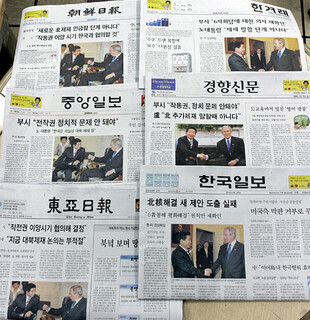hankyoreh
Links to other country sites 다른 나라 사이트 링크
[Editorial] Manipulating the media

It has been revealed that the presidential transition team directed civil servants at the Ministry of Culture and Tourism, which is responsible for overseeing the publishing of books and periodicals, to report to it about big names in the news media. Reportedly it also told ministry officials to look into advertisers who have influence over given media companies. This is an incident that simply should not have happened in a democratic society, an incident that was an open display of an intention to control the media. The transition team later explained that it took place because of the individual and unauthorized actions of one team member, with the surname Park, while he was at the ministry office. It has issued an official apology, called Park back from the ministry, and destroyed the documentation that was produced on its request. However, there are more than a few aspects of this that are suspicious enough to make it difficult to just move on and accept the transition team’s explanation.
According to the transition team, Park thought he would ask the ministry to look into individual members of the media to see who he might have nominated to an advisory committee. However, those that were investigated are editors and the heads of media outlets’ politics desks, hardly the kind of people you would appoint to an advisory committee. The fact that ministry officials were told to look into their “political tendencies” is also suspicious. Basic personal information about someone is something you should be able to ascertain without a whole separate inquiry, something that hints at the fact that the main goal of the investigation was to determine their political inclinations. Including in that investigation the presidents of companies that run advertisements in the news media is something that would be hard to interpret as something other than an attempt to use advertisers to manipulate the news. Even the military dictatorships did not go about it so openly.
Even back during the presidential campaign there were moves by aides to President-elect Lee Myung-bak and the Grand National Party trying to tame the media to their liking. They coerced media that were critical of Lee or the GNP with criminal lawsuits and complaints and with civil suits for massive amounts of cash. When the Munhwa Broadcasting Corporation ran an interview with Erica Kim about Lee and the BBK scandal, one Lee aide openly threatened that MBC would be privatized if Lee won the election. This is what makes it hard to rid yourself of the suspicion that what transpired at the Ministry of Culture and Tourism was related to the kind of thinking common during the military dictatorships. The presidential transition team denies it, but it is hard to ignore some media reports that said ministry officials were told to look into members of the media at the direction of someone other than Park, meaning that he would not have been alone in his actions.
In its move to do away with the “newspaper law” and in other things as well, Lee’s new administration is showing signs of regressing to years past. Lee and the GNP need to spend some time in deep thought. History has taught us that when state authority rejects the free criticism and watchfulness of the media and tries to manipulate it instead, it is the powers that be who lose in the end.
Please direct questions or comments to [englishhani@hani.co.kr]
Editorial・opinion
![[Guest essay] The real reason Korea’s new right wants to dub Rhee a founding father [Guest essay] The real reason Korea’s new right wants to dub Rhee a founding father](https://flexible.img.hani.co.kr/flexible/normal/500/300/imgdb/original/2024/0423/8317138574257878.jpg) [Guest essay] The real reason Korea’s new right wants to dub Rhee a founding father
[Guest essay] The real reason Korea’s new right wants to dub Rhee a founding father![[Column] ‘Choson’: Is it time we start referring to N. Korea in its own terms? [Column] ‘Choson’: Is it time we start referring to N. Korea in its own terms?](https://flexible.img.hani.co.kr/flexible/normal/500/300/imgdb/original/2024/0423/3617138579390322.jpg) [Column] ‘Choson’: Is it time we start referring to N. Korea in its own terms?
[Column] ‘Choson’: Is it time we start referring to N. Korea in its own terms?- [Editorial] Japan’s rewriting of history with Korea has gone too far
- [Column] The president’s questionable capacity for dialogue
- [Column] Are chaebol firms just pizza pies for families to divvy up as they please?
- [Column] Has Korea, too, crossed the Rubicon on China?
- [Correspondent’s column] In Japan’s alliance with US, echoes of its past alliances with UK
- [Editorial] Does Yoon think the Korean public is wrong?
- [Editorial] As it bolsters its alliance with US, Japan must be accountable for past
- [Guest essay] Amending the Constitution is Yoon’s key to leaving office in public’s good graces
Most viewed articles
- 1[Guest essay] The real reason Korea’s new right wants to dub Rhee a founding father
- 2Terry Anderson, AP reporter who informed world of massacre in Gwangju, dies at 76
- 3[Column] ‘Choson’: Is it time we start referring to N. Korea in its own terms?
- 4Why Korea shouldn’t welcome Japan’s newly beefed up defense cooperation with US
- 5Opposition calls Yoon’s chief of staff appointment a ‘slap in the face’
- 6[Column] The clock is ticking for Korea’s first lady
- 7Senior doctors cut hours, prepare to resign as government refuses to scrap medical reform plan
- 8New AI-based translation tools make their way into everyday life in Korea
- 9[Editorial] Japan’s rewriting of history with Korea has gone too far
- 10[Column] Are chaebol firms just pizza pies for families to divvy up as they please?